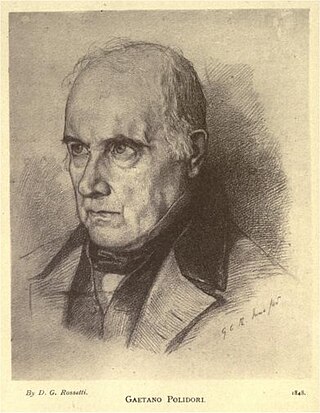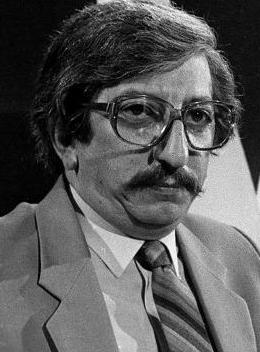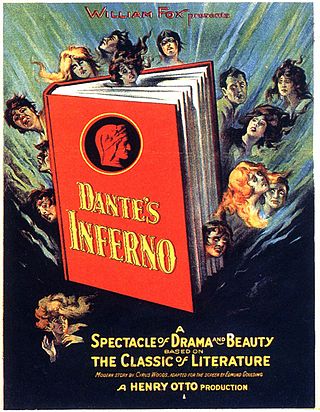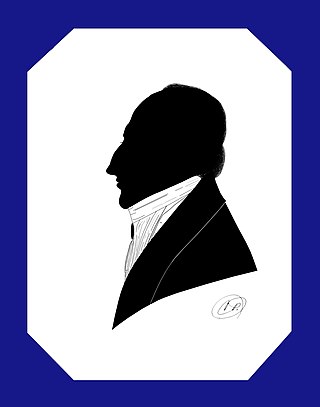Related Research Articles

Dante Alighieri, most likely baptized Durante di Alighiero degli Alighieri and often referred to as Dante, was an Italian poet, writer, and philosopher. His Divine Comedy, originally called Comedìa and later christened Divina by Giovanni Boccaccio, is widely considered one of the most important poems of the Middle Ages and the greatest literary work in the Italian language.

The Divine Comedy is an Italian narrative poem by Dante Alighieri, begun c. 1308 and completed around 1321, shortly before the author's death. It is widely considered the pre-eminent work in Italian literature and one of the greatest works of Western literature. The poem's imaginative vision of the afterlife is representative of the medieval worldview as it existed in the Western Church by the 14th century. It helped establish the Tuscan language, in which it is written, as the standardized Italian language. It is divided into three parts: Inferno, Purgatorio, and Paradiso.

The Count of Monte Cristo is an adventure novel written by French author Alexandre Dumas (père) completed in 1844. It is one of the author's most popular works, along with The Three Musketeers. Like many of his novels, it was expanded from plot outlines suggested by his collaborating ghostwriter Auguste Maquet.

Brunetto Latini was an Italian philosopher, scholar, notary, politician and statesman.

Gaetano Fedele Polidori was an Italian writer, political and scholar living in Highgate. He was the son of Agostino Ansano Polidori (1714–1778), a physician and poet who lived and practised in his native Bientina, near Pisa, Tuscany.

Dante Bruno Fascell was an American politician who represented Florida as a member of the United States House of Representatives from 1955 to 1993. He served as chairman of the House Foreign Affairs Committee for nine years.

Abramo Giulio Umberto Federigo Enriques was an Italian mathematician, now known principally as the first to give a classification of algebraic surfaces in birational geometry, and other contributions in algebraic geometry.

The Astronomical Observatory of Capodimonte is the Neapolitan department of Istituto Nazionale di Astrofisica, the most important Italian institution promoting, developing and conducting scientific research in the fields of astronomy, astrophysics, and space science.

Pietro della Vigna was an Italian jurist and diplomat, who acted as chancellor and secretary (logothete) to Emperor Frederick II. Falsely accused of lèse-majesté, he was imprisoned, blinded and committed suicide soon after. He appears as a character in the Inferno of the Divine Comedy by Dante Alighieri.

Dante Caputo was an Argentine academic, diplomat and politician, who served as the nation's foreign minister under President Raúl Alfonsín.
Devil May Cry is an urban fantasy action-adventure game franchise created by Hideki Kamiya. It is primarily developed and published by Capcom. The series centers on the demon hunter Dante and his efforts to thwart various demon invasions of Earth. Its gameplay consists of combat scenarios in which the player must attempt to extend long chains of attacks, avoiding damage and exhibiting stylized combat by varying their attacks; this combat, along with time and the number of items collected and used, are considered in grading the player's performance.
Federigo Fregoso, was an Italian nobleman, prelate and general.

The Wood of the Self-Murderers: The Harpies and the Suicides is a pencil, ink and watercolour on paper artwork by the English poet, painter and printmaker William Blake (1757–1827). It was completed between 1824 and 1827 and illustrates a passage from the Inferno of the Divine Comedy by Dante Alighieri (1265–1321).

Inferno is the first part of Italian writer Dante Alighieri's 14th-century narrative poem The Divine Comedy. It is followed by Purgatorio and Paradiso. The Inferno describes the journey of a fictionalised version of Dante himself through Hell, guided by the ancient Roman poet Virgil. In the poem, Hell is depicted as nine concentric circles of torment located within the Earth; it is the "realm ... of those who have rejected spiritual values by yielding to bestial appetites or violence, or by perverting their human intellect to fraud or malice against their fellowmen". As an allegory, the Divine Comedy represents the journey of the soul toward God, with the Inferno describing the recognition and rejection of sin.

Dante's Inferno is a 1924 American silent drama film directed by Henry Otto that was released by Fox Film Corporation and adapted from Inferno, part of Dante Alighieri's epic poem Divine Comedy. The film mixes material from Dante's "Inferno" with plot points from Charles Dickens' A Christmas Carol. The book was filmed earlier in 1911 in Italy as L'Inferno, and Fox later remade the film in 1935, again as Dante's Inferno, starring Spencer Tracy in the lead role.

Federigo Tozzi was an Italian writer.
Guillermo Capadocia (1909–1951) was a Filipino communist politician and labour leader. He was a prominent leader of the Communist Party in the Philippines (PKP) and different labour movements. During the last one and a half years of his life he was a regional guerrilla commander of the Hukbalahap.
Ubaldini is an Italian surname. Notable people with the surname include:

Ottaviano Fregoso was the Doge of the Republic of Genoa.

Federigo Fiorillo was a mandolinist and composer, who wrote thirty-six caprices for violin, also called études.
References
- ↑ Dizionario biografico universale, Volume 5, by Felice Scifoni, Publisher Davide Passagli, Florence (1849); page 455.
- ↑ Treccani Encyclopedia; di Giuseppe Izzi, Enciclopedia Dantesca (1970).